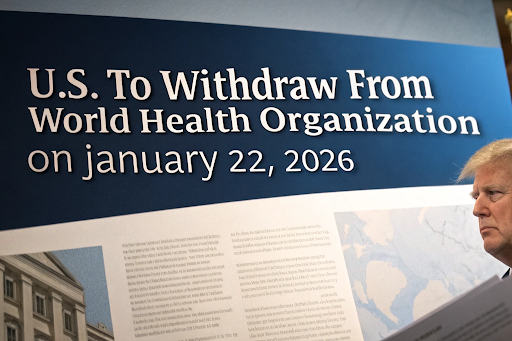Table of Contents
ToggleU.S. to Withdraw from World Health Organization on January 22 , 2026 : United Nations

The announcement that the United States will withdraw from the World Health Organization (WHO) on January 22 , 2026 , has sent ripples through the global health community . The decision , confirmed by the United Nations , has sparked significant debate about the future of global health cooperation , international diplomacy , and America ’s role in tackling worldwide health crises . As nations face complex health challenges like pandemics and climate-related illnesses, the timing and implications of this decision are profound .
Why the U.S. Decision to Withdraw Matters
The United States has long been a pivotal member of the World Health Organization , contributing substantial funding and resources to global health initiatives . As one of the organization ’s top funders, the U.S . withdrawal will leave a funding gap that could jeopardize critical programs, including those addressing infectious diseases , vaccine distribution , and maternal health .
This move is not without precedent . In 2020, the U.S. began proceedings to withdraw from the WHO under the Trump administration , citing alleged mismanagement of the COVID-19 pandemic and concerns over the organization ’s relationship with China . While the Biden administration later reversed this decision , the current announcement signals a more definitive stance and raises questions about long term U.S . foreign policy goals .
Key Reasons Behind the Withdrawal
The decision appears to stem from several domestic and international concerns :
- Alleged Inefficiencies in WHO Operations : Critics in the U.S . government argue that the WHO has failed to adequately address key global health challenges and operates with bureaucratic inefficiencies .
- Geopolitical Tensions : Accusations of the WHO being overly influenced by certain member states, particularly China, have fueled mistrust .
- Shifting Priorities in U.S. Foreign Policy : The move aligns with a broader trend of focusing on domestic health priorities and reducing reliance on multilateral institutions .
Impacts of the Withdrawal
The U.S. withdrawal from WHO will have far-reaching consequences for both the organization and global health efforts . Here are some of the most critical impacts :
1. Funding Challenges for WHO Initiatives
With the U.S. contributing roughly 15% of the WHO ’s total budget , its departure will leave a significant funding gap . Programs focused on eradicating diseases like polio and tuberculosis could face severe setbacks .
2. Global Health Inequalities
Many low and middle income countries depend on WHO support for essential healthcare services . Reduced funding may widen global health inequalities , leaving vulnerable populations at greater risk .
3. Weakened Pandemic Preparedness
As the COVID-19 pandemic demonstrated , a coordinated global response is essential for managing health crises . The absence of U.S . leadership in this area could hinder the world’s ability to respond to future pandemics .
4. Diplomatic Isolation
This decision could signal a retreat from international cooperation , potentially damaging the U.S .’s relationships with allies and reducing its influence in global policymaking .
Potential Benefits of the Withdrawal
While the decision has drawn widespread criticism , supporters argue that it could have certain benefits for the U.S .:
- Increased Focus on Domestic Health : Redirecting funds previously allocated to the WHO could bolster domestic healthcare infrastructure .
- Reduced Bureaucratic Constraints : Proponents believe that the U.S . can address global health challenges more efficiently through bilateral agreements and independent initiatives .
The Role of the United Nations
The United Nations (UN) has confirmed the withdrawal timeline , emphasizing the need for continued collaboration to address global health challenges . However , the UN also acknowledged the potential disruptions that this decision may cause . As a key coordinating body , the UN may need to step up its efforts to fill the void left by the U.S .
Reactions from the International Community
The announcement has elicited a range of responses from world leaders , health experts , and advocacy groups :
- European Union : Expressed deep concern about the implications for global health security .
- China : Reiterated its commitment to supporting the WHO , positioning itself as a potential alternative leader in global health .
- Non-Governmental Organizations (NGOs) : Highlighted the urgent need for alternative funding sources to sustain critical health programs .
What’s Next for Global Health?
The U.S. withdrawal from WHO will undoubtedly reshape the global health landscape . To mitigate the potential fallout , the international community must explore new funding models and strengthen multilateral cooperation . Key strategies could include :
- Expanding the funding base to include contributions from private sector partners and philanthropic organizations .
- Establishing regional health alliances to address specific challenges in different parts of the world .
- Enhancing the transparency and accountability of the WHO to restore trust and confidence .
U.S. to Withdraw from WHO: A Defining Moment
As the countdown to January 22, 2026 , continues, this decision marks a defining moment for both the United States and the global health community . While the move reflects shifting priorities in U.S . foreign policy, its long term effects on global health outcomes remain uncertain . The hope is that this transition will inspire innovative solutions and renewed commitments to health equity worldwide .
